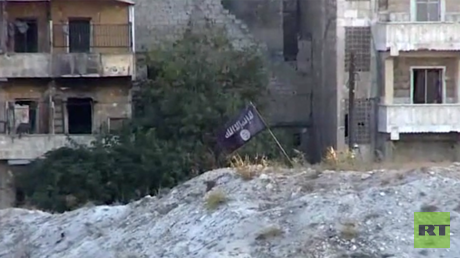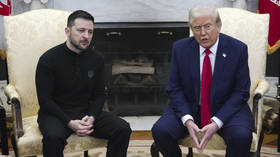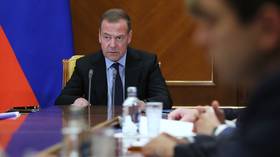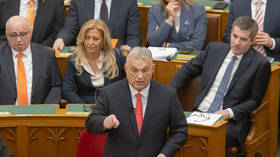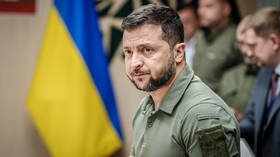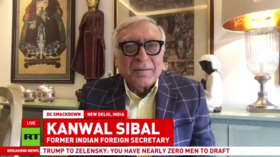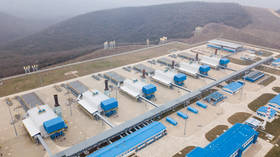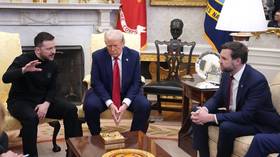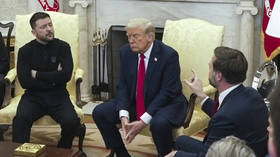‘It’s different’: US justifies Saudi ‘self-defense’ in Yemen, slams Russia’s actions in Syria
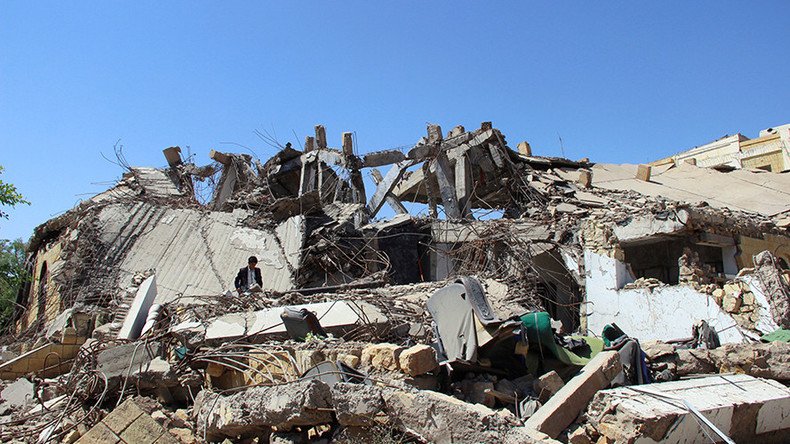
The US says Saudi Arabia’s bombing of Yemen was an act of “self-defense” against Iranian missiles on its border. While there are similarities with the Syrian conflict, Washington sees “differences” between the deaths of over 150 civilians, blamed on Riyadh, and the situation in Aleppo.
“It is different,” the State Department’s John Kirby has told AP’s Matt Lee, when asked whether Capitol Hill sees a difference between the recent attack in Yemen and “what you accuse the Russians and the Syrians and the Iranians of doing in Syria, particularly Aleppo?”
The question specifically referred to an airstrike that targeted a funeral service in the Yemeni capital, Sana’a, killing more than 150 civilians and injuring over 525.
Located on opposite sides of Saudi Arabia, Yemen and Syria bear few similarities, but have one thing in common: a civil conflict between their governments and rebels, which later evolved into larger-scale wars, with the intervention of foreign forces. However, the rules of the game appear to be different for each case.
‘Volcano of Rage’: Thousands rally outside UN office in Yemen after deadly airstrike blamed on Saudi-led coalition https://t.co/gx2WFphefqpic.twitter.com/G0c5ovvHnQ
— RT (@RT_com) October 9, 2016
For the State Department, the Saudi pledge to investigate the bombing seems to offer some reduction in the significance of its actions.
“The Saudis publicly said that they were going to investigate this as – for the potential of it being, in fact, wrongly implemented and wrongly executed,” Kirby said. That is something, he added, he hasn’t seen the Syrian army or the Russian military do “not once.”
When asked about Russia’s recent demand for an investigation into an attack on a humanitarian convoy in Syria, Kirby said “it’s not exactly been a clarion call.”
Addressing the attack in Sana’a, the UN called the bombing “outrageous” and pointed out constant strikes, specifically at places of mass congregation, which lacked proper recourse.
“Since the beginning of this conflict in Yemen, weddings, marketplaces, hospitals, schools – and now mourners at a funeral – have been hit, resulting in massive civilian casualties and zero accountability for those responsible,” the UN said in a statement Monday.
Yet, when it comes to Saudi Arabia and its intervention in Yemen, the State Department said it is important to remember that Riyadh has a “pressing requirement for self-defense” because of threats it faces from Iranian missiles launched by Houthi rebels near the border.
However, there is no similar judgment regarding Syria, where rebel groups along with Al-Qaeda-linked terrorists presumably hold people at gunpoint in Aleppo.
Kirby accused Moscow and the Assad forces of “a concerted” and “very deliberate” effort to take “to subdue” the city by force.
As RT learned from locals still living in western Aleppo, it was not Russian forces that terrified them.
“Some people managed to escape, but rebels snipers are shooting at them when they see them,” a man told RT. “They don’t let civilians leave.”
A woman said that everyone trying to get water from a well was also shot at while children described shells destroying their house.
RT has asked the State Department to comment on whether the people were effectively being “held” in Aleppo.
“I can’t confirm that report. You know I don’t get into battlefield reports; I’m not going to do that,” Kirby. “And your question about being held hostage, there should be – and I’ve seen reports that they’re allowed to leave,” he added, blaming the Syrian government and the Russian military.
The Department’s spokesman also declined to speak about Al-Qaeda-linked terrorists, who remain in the area along with anti-Assad rebels. Moscow has unsuccessfully been asking the US to dissociate terrorists from the so-called moderate opposition.
Kirby says it’s unlikely they would want to leave Aleppo, hinting that the responsibility also lay with Russia.
“They’re not likely to want to leave while they’re continuing to be bombed,” he said.
When specifically asked whether it was America’s strategy to let Al-Qaeda run the area, Kirby declined to answer.
Washington has been supplying rebels with arms, some of which it has admitted ended up in the hands on terrorists.
In September, a US military spokesman said that rebels surrendered six pick-up trucks and about one-quarter of their ammunition to Al-Qaeda linked Al-Nusra Front, now known as Jabhat Fatah al Sham, in exchange for safe passage.
When it comes to Yemen, the US also played, though indirectly, its part in the conflict aiding Saudi Arabia and its coalition partners with weapons, often used in attacks targeting civilians. Following the airstrike, the White House said it would reassess its help to Saudi Arabia.
Arab coalition agrees to join US in investigating #Yemen burial strike that killed at least 140 https://t.co/kwlVFAb7ZL
— RT (@RT_com) October 9, 2016
Despite massive casualties and some opposition among lawmakers, US-Saudi arms sales have been thriving with the Senate just recently blocking a bipartisan bill that would stop the deal with Riyadh.
WATCH MORE:

